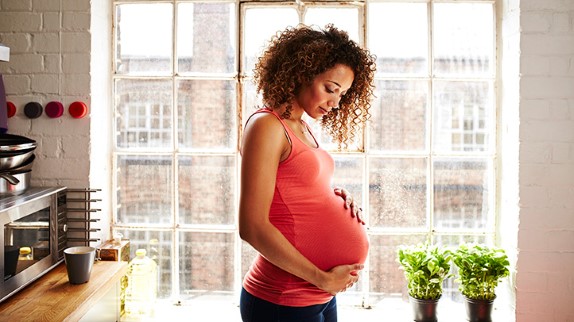As your pregnancy progresses, you may start to feel winded even after minimal amounts of physical exertion. As usual, those pregnancy hormones are to blame for taking your breath away. Here's what you need to know about shortness of breath during pregnancy.
Is it normal to be short of breath during pregnancy?
Although mild breathlessness can be less than comfortable, it's totally normal. It's also completely safe for your baby, who remains continually well-oxygenated via your placenta.
When does shortness of breath generally start?
Shortness of breath may start during the first trimester of pregnancy, and respiratory rates rise then as well. In the second and third trimesters, breathlessness may increase as your baby continues to grow.
What causes shortness of breath during pregnancy?
Pregnancy hormones stimulate your brain to increase the frequency and depth of your breaths, so you take in more oxygen for your growing baby-to-be. Those hormones also swell the capillaries in your respiratory tract and relax the muscles of the lungs and bronchial tubes, making you feel like you're sucking wind after a trip to the fridge.
Later in pregnancy, your uterus pushes up against your diaphragm as it grows.[1] This compresses your lungs, limiting their ability to fully expand when you take a breath and causing you to feel like you've just run a marathon when you've only climbed a flight of stairs.
What can I do about shortness of breath during pregnancy?
Though you can't completely relieve this common pregnancy symptom, there are some things you can do to help ease it a little bit:
- Stand as straight as you can. Proper posture gives your lungs a little more room to do their job.
- Sleep propped up on your left side. Sleeping on your left side is the best for circulation during pregnancy, and propping yourself up with pillows may also help with shortness of breath.
- Go easy on yourself. You can definitely still go about your daily activities and continue exercising during pregnancy.[2] Just listen to your body and don't push yourself too hard.
When can I expect the shortness of breath to end?
Here's something to look forward to: You might feel significantly less short of breath at the end of your pregnancy when your baby drops down into your pelvis. This pre-labor event — called "lightening" — will free up room for your lungs.
Read This Next
When should I call my doctor about shortness of breath during pregnancy?
If you're feeling constantly breathless, talk to your doctor. Breathlessness can sometimes be caused by anemia during pregnancy due to a depletion of oxygen-carrying red blood cells, so your practitioner may want to check your iron levels. Also consult with your doctor if you have asthma.
If you're having a very hard time breathing and your lips or fingertips seem to be turning bluish, or if you have chest pain and a rapid pulse, call your practitioner immediately. You should also check in if you experience a sudden onset of shortness of breath, of if you feel breathless inexplicably (e.g., you've been sitting down and you're having a hard time breathing).




 Trending On What to Expect
Trending On What to Expect







